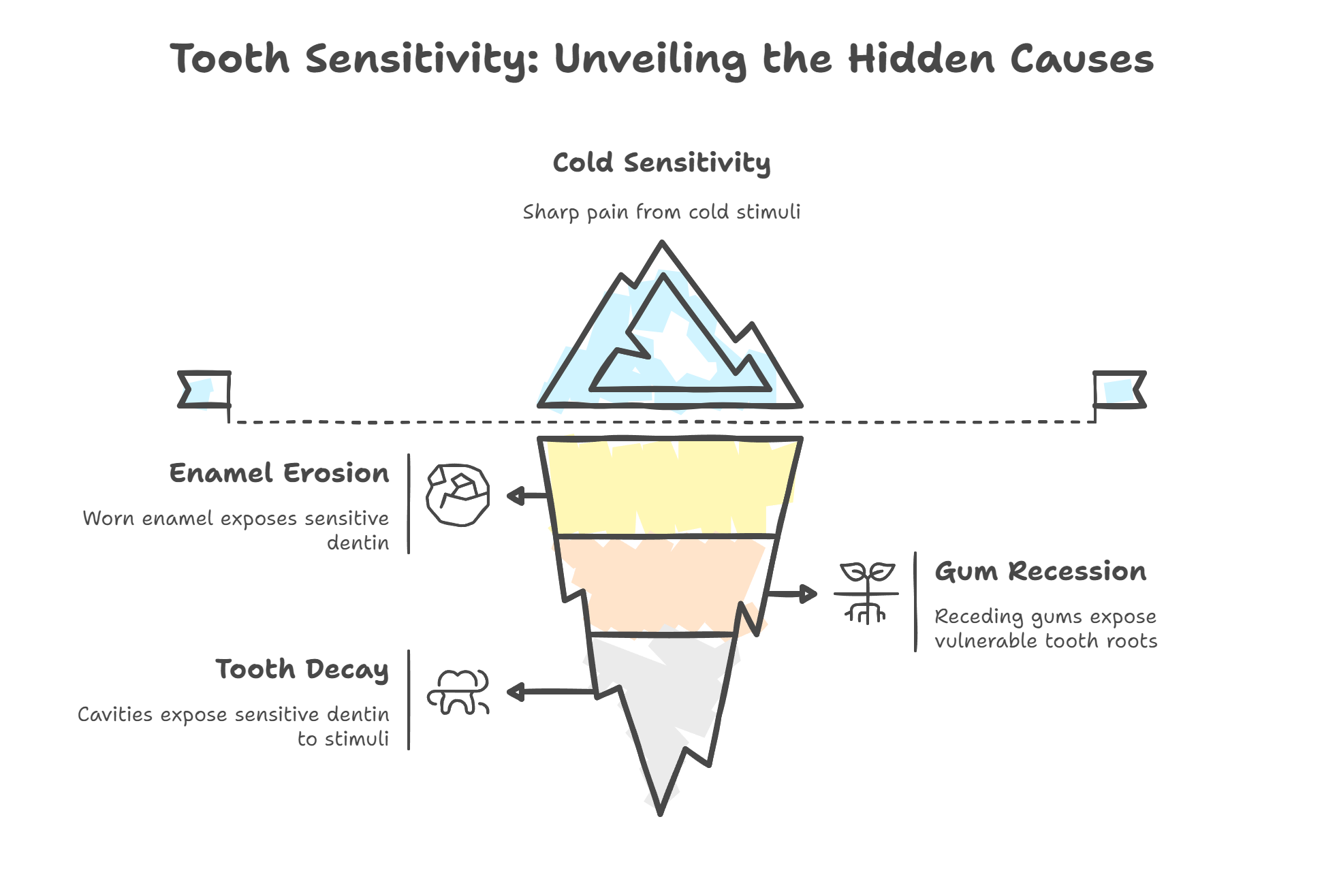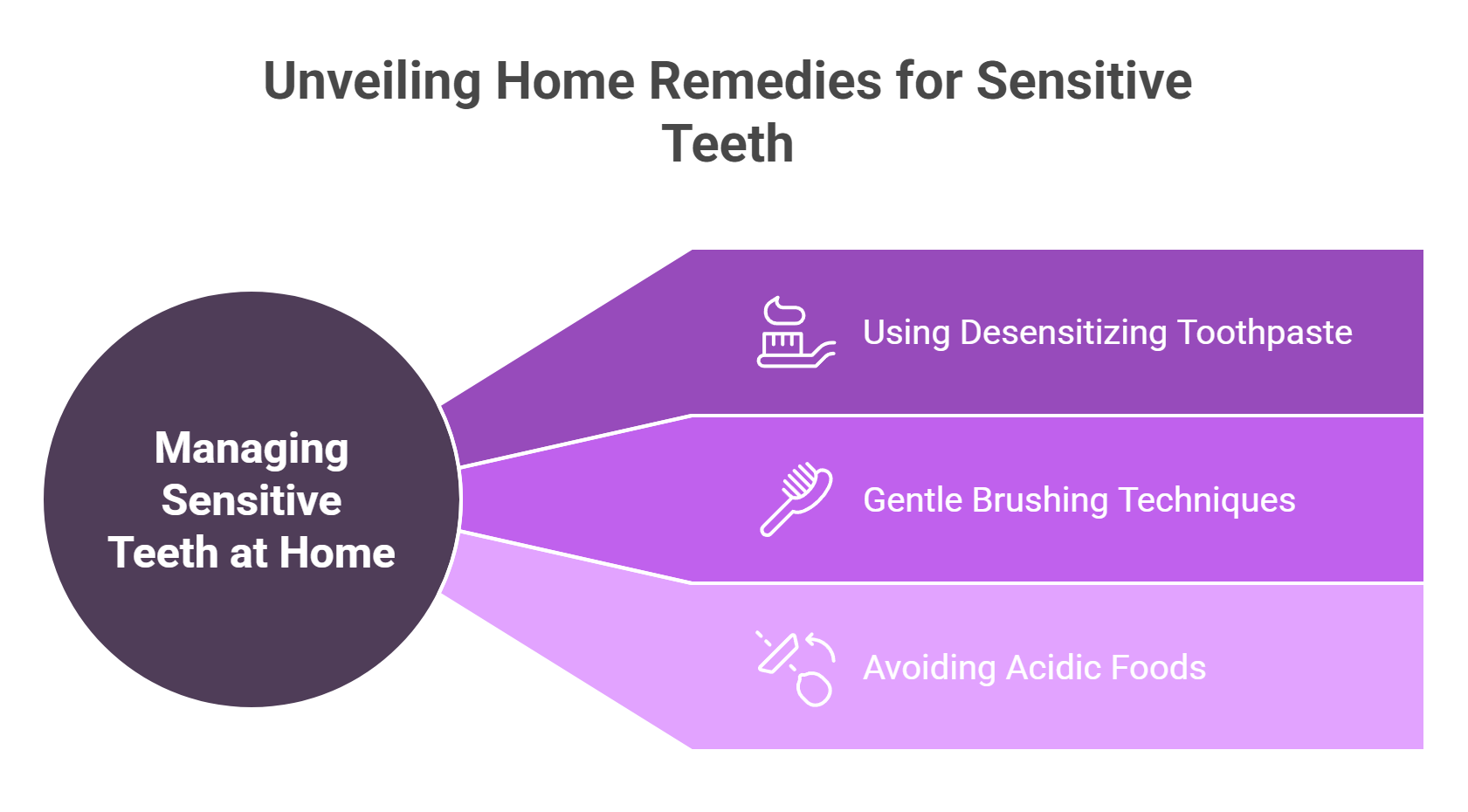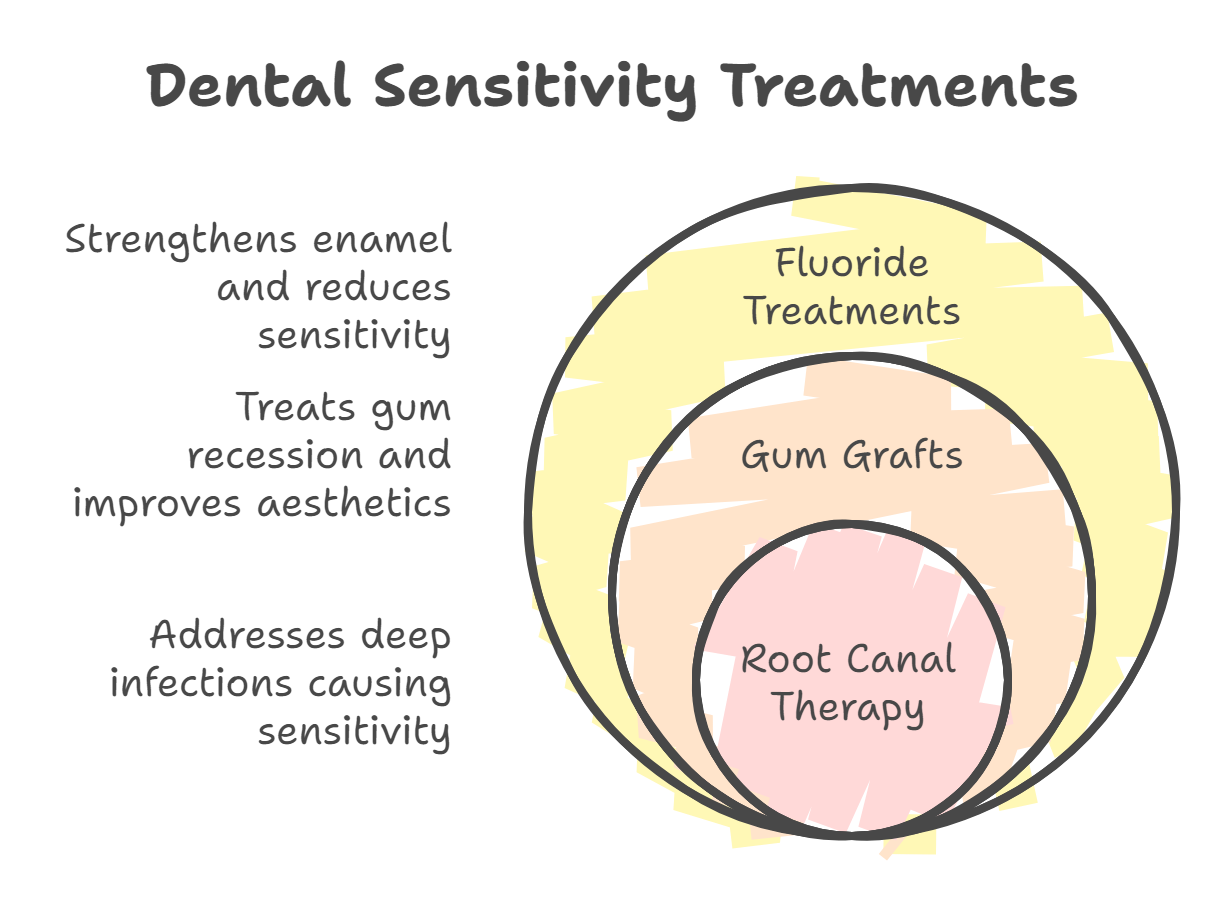If you’ve ever winced while drinking a cold beverage or felt a sharp pain when eating ice cream, you’re probably asking yourself, ‘why are my teeth sensitive to cold?’ The main reason is exposure of the nerves within your teeth to cold temperatures, often due to enamel erosion, gum recession, or tooth decay. This article will explore these causes and offer solutions for managing sensitivity.
Key Takeaways
-
Cold sensitivity in teeth is primarily caused by exposure of nerves due to enamel erosion, gum recession, and tooth decay.
-
Effective management includes using desensitizing toothpaste, gentle brushing techniques, and avoiding acidic foods.
-
Professional treatments such as fluoride treatments, gum grafts, and root canal therapy may be necessary for severe cases of tooth sensitivity.
What Is Tooth Sensitivity?
Tooth sensitivity refers to a sharp, sudden pain or discomfort in one or more teeth, often triggered by cold temperatures, hot drinks, acidic foods, or even cold air. For many people, that sharp sensation hits when eating cold foods like ice cream, drinking cold beverages, or brushing with a non-soft bristled toothbrush.
The pain usually feels like a jolt that shoots deep into the tooth or even lingers for a few seconds. People often describe it as feeling similar to a brain freeze, but located in a specific tooth or area of the mouth. You may notice it more when you sip a hot cup of coffee after something cold, or when your teeth hurt just from breathing in cold air.
Tooth sensitivity can affect a single tooth or multiple teeth and may come and go depending on your habits and environment. It’s a common condition that interferes with everyday comfort, from eating and drinking to brushing and flossing.
If you’re wondering, “why are my teeth sensitive to cold?”, the first step is understanding how sensitivity feels—and knowing that it’s not something you have to live with permanently.
Causes of Tooth Sensitivity to Cold

Tooth sensitivity to cold often comes from underlying issues like enamel erosion, gum recession, or tooth decay. These problems expose the sensitive parts of the tooth, making you feel that sudden sharp pain from cold foods, cold drinks, or even cold air.
Here’s a closer look at the most common causes.
Several factors can lead to teeth sensitive tooth sensitivity, particularly to cold temperatures. Dental sensitivity can also result from a tooth injury or a chipped tooth, both of which may expose the tooth surface and underlying nerves, making the tooth sensitive to cold. Common culprits include enamel erosion, gum recession, and tooth decay. Each of these conditions exposes the nerves within the teeth, making them more susceptible to cold stimuli. These types of dental sensitivity, especially those caused by a chipped tooth or tooth injury, require prompt attention to prevent further discomfort and complications.
Understanding these underlying issues is crucial for effective management and prevention of tooth sensitivity.
Enamel Erosion
Enamel erosion is one of the leading causes of tooth sensitivity to cold. Your tooth enamel acts as a hard, protective barrier, shielding the inner layers of your teeth from cold temperatures and other stimuli. But over time, that protective layer can wear down due to:
-
Frequent consumption of acidic foods and sugary drinks
-
Aggressive brushing with hard bristles or abrasive toothpaste
-
Teeth whitening treatments
-
Grinding teeth (bruxism)
Once enamel is worn away, the sensitive dentin beneath becomes exposed. That dentin is filled with tiny tubules that connect directly to the nerve roots, which is why cold drinks or foods can cause a sudden sharp pain.
To help strengthen tooth enamel and prevent erosion:
-
Use a soft bristled toothbrush
-
Avoid brushing right after acidic meals
-
Try desensitizing toothpaste or fluoride gel
-
Ask your dentist about enamel covers or a nightguard if you grind your teeth
A review found that enamel and dentin damage from erosion, abrasion, and decay significantly increases cold sensitivity.
Gum Recession
Gum recession happens when gum tissue pulls away from the tooth, exposing the tooth roots. Unlike the crown of the tooth, which is covered by enamel, the roots lack that protection—making them especially vulnerable to cold sensitivity.
This exposure can lead to frequent dental sensitivity, especially to cold air, cold foods, and even brushing. Common causes of receding gums include:
-
Gum disease
-
Overbrushing or using a brush that's not soft bristled
-
Genetic predisposition
-
Age-related gum wear
Once the root surfaces are exposed, pain can develop quickly and worsen over time if not addressed. In severe cases, a gum graft may be needed to restore coverage and reduce pain.
A 2024 case report links gingival recession and abrasion with increased cold sensitivity due to root exposure.
Tooth Decay and Cavities
Tooth decay occurs when bacteria from plaque buildup break down the tooth enamel with acid. As decay progresses, it creates cavities—small holes that compromise the structure of the tooth and expose the sensitive dentin.
When these openings reach close to the nerve endings, cold sensitivity becomes noticeable—especially when eating cold foods, drinking cold beverages, or rinsing with cold water.
Key risk factors for decay include:
-
Poor brushing and flossing habits
-
Frequent snacking or high sugar intake
-
Delayed dental checkups
-
Existing teeth cracks or a chipped tooth
Preventing decay helps reduce sensitivity and avoid more serious dental treatments like root canals.
Loss of enamel and cementum from decay is one of the most common causes of cold sensitivity, especially as dentinal tubules become exposed.
Diagnosing Tooth Sensitivity
Diagnosing the cause of tooth sensitivity is essential to finding the right treatment.
If you experience persistent sensitivity to cold, it’s important to make an appointment with your dentist. Consulting a dental professional ensures you receive an accurate diagnosis and appropriate treatment for your dental sensitivity. They can help determine the underlying cause of your discomfort, whether it’s due to enamel erosion, gum recession, or tooth decay.
Your dentist may:
-
Perform a thorough examination of your teeth and gums, possibly including X-rays, to identify any issues.
-
Apply fluoride treatments to strengthen enamel.
-
Recommend other targeted treatments based on the specific cause of your sensitivity.
Seeking prompt dental treatment not only alleviates pain but also prevents more serious dental problems down the line.
Home Remedies for Sensitive Teeth

Managing sensitive teeth at home can bring significant relief. There are several effective home remedies that can help reduce tooth sensitivity and improve oral health, especially for those dealing with a sensitive tooth.
Here are a few proven ways to manage tooth sensitivity at home
Using Desensitizing Toothpaste
Desensitizing toothpaste is a popular and effective home remedy for managing sensitive teeth. These toothpastes contain active ingredients that help block pain signals from reaching the nerves, providing relief from sensitivity. Regular use of desensitizing toothpaste can significantly improve sensitivity over time, making it easier to enjoy cold foods and drinks without discomfort.
To get the best results, it’s important to use the toothpaste as directed, typically twice a day. Consistency is key, as it may take several weeks to notice a significant reduction in sensitivity.
Gentle Brushing Techniques
Brushing your teeth too aggressively can cause more harm than good, especially for those with sensitive teeth. To minimize trauma to your teeth and gums:
-
Use a soft-bristled toothbrush with soft bristles.
-
Apply gentle pressure while brushing.
-
Use circular motions instead of back-and-forth scrubbing, as this is gentler and more effective.
Additionally, avoid abrasive toothpastes to prevent further enamel thinning and reduce sensitivity. Opt for toothpastes that are specifically formulated for sensitive teeth.
Avoiding Acidic Foods
Acidic foods and drinks can accelerate enamel erosion, leading to increased tooth sensitivity. To protect your enamel, it’s important to limit the intake of acidic foods such as citrus fruits, sodas, and certain juices.
Drinking water after consuming acidic foods can help neutralize acidity and protect your teeth.
Professional Dental Treatments

For severe tooth sensitivity, professional dental treatments may be necessary. Dentists offer a range of treatments that can effectively address the underlying causes of sensitivity, from fluoride treatments to gum grafts and root canal therapy.
Your dentist will work with you to develop a personalized treatment plan tailored to your specific needs, ensuring long-term relief from dental sensitivity.
Fluoride Treatments
Fluoride treatments are a common and effective solution for strengthening tooth enamel and reducing sensitivity. Fluoride gel works by remineralizing the enamel and reinforcing the tooth structure, making it more resistant to decay and sensitivity.
These treatments are typically applied during a dental visit through a tray or paint-on method for optimal results, including various dental procedures, teeth whitening, and dental work.
Gum Grafts
Gum grafting is a surgical procedure used to treat gum recession, a common cause of tooth sensitivity. The procedure involves taking tissue from another area of the mouth and attaching it to the receded gums to cover exposed tooth roots. This not only reduces sensitivity but also improves the overall aesthetics of the smile by restoring the gum line.
There are several types of gum graft, including:
-
Connective tissue grafts
-
Free gingival grafts
-
Pedicle grafts Each is tailored to specific patient needs. The success of gum graft depends on proper post-operative care and adherence to oral hygiene practices.
Root Canal Therapy
Root canal therapy is often necessary for severe cases of tooth sensitivity caused by infection in the pulp. During this procedure:
-
The dentist removes the infected tooth pulp tissue from the tooth root, effectively alleviating sensitivity and preventing further infection.
-
The infection is cleaned out.
-
The tooth is sealed to prevent future issues.
This treatment is particularly effective for teeth that have become extremely sensitive due to deep decay or injury. By addressing the root cause of the sensitivity, root canal therapy can provide long-term relief.
Preventing Future Sensitivity
Preventing tooth sensitivity starts with adopting healthy oral hygiene habits. Key practices include:
-
Brushing gently with a soft-bristled toothbrush to prevent enamel damage and gum recession, two major causes of sensitivity.
-
Avoiding whitening toothpastes.
-
Avoiding alcohol-based mouthwashes to help prevent further sensitivity.
Common triggers for dental sensitivity include drinking cold drinks, enjoying hot coffee, or sipping a hot cup of tea. Recognizing these triggers can help you take steps to prevent discomfort.
Diet also plays a crucial role in preventing sensitivity. Limiting foods and drinks high in acid and sugar can protect enamel from erosion. Regular visits to the dentist for check-ups and cleanings can help identify potential issues before they lead to sensitivity.
For those prone to grinding teeth, using a mouthguard can offer protection and reduce the risk of sensitivity.
Teeth Sensitive To Cold Wrapped Up
Tooth sensitivity to cold doesn’t have to be something you just live with. Understanding the root causes and taking consistent steps—both at home and with your dentist—can help you reclaim comfort and protect your smile long-term.
-
Enamel erosion, gum recession, and tooth decay are the top culprits behind cold sensitivity
-
You can often reduce sensitivity at home with desensitizing toothpaste, gentle brushing, and avoiding acidic foods
-
For lasting relief, professional treatments like fluoride gel, gum grafts, or even root canals may be necessary
Looking for real results? Throughout this article, you’ve seen how strengthening your enamel is key to reducing pain. Say goodbye to discomfort—explore SNOW’s enamel-protecting products and start your journey to a pain-free, confident smile.
Frequently Asked Questions
How do you fix cold, sensitive teeth?
To fix cold, sensitive teeth, it is important to address the underlying causes such as enamel erosion, gum recession, or tooth decay. Effective treatments include using desensitizing toothpaste, adopting gentle brushing techniques with a soft-bristled toothbrush, avoiding acidic foods, and seeking professional dental care. Professional treatments may involve fluoride applications to strengthen tooth enamel, gum grafts to cover exposed roots, or root canal therapy for severe cases.
Why are my teeth suddenly sensitive to ice?
Teeth can suddenly become sensitive to ice due to factors like enamel wear, gum recession exposing the sensitive dentin and nerve roots, tooth decay, or even recent dental procedures. Sudden sensitivity may also result from a cracked tooth or teeth cracks that expose the inner layers of the tooth to cold stimuli. Identifying and treating these causes is important to alleviate discomfort.
Can tooth sensitivity to cold go away?
Yes, tooth sensitivity to cold can often be reduced or eliminated by addressing the causes. Using desensitizing toothpaste regularly, improving oral hygiene with a soft-bristled toothbrush, avoiding acidic foods, and receiving professional treatments like fluoride gels or gum grafts can help. However, if the sensitivity is due to severe decay or infection, more extensive dental treatment may be necessary.
Does cold sensitivity mean cavity?
Cold sensitivity does not always mean you have a cavity, but it can be a sign of tooth decay. Other causes include enamel erosion, gum recession, exposed tooth roots, cracked teeth, or dental sensitivity from other factors. A dental professional can diagnose the exact cause and recommend appropriate treatment.



































































